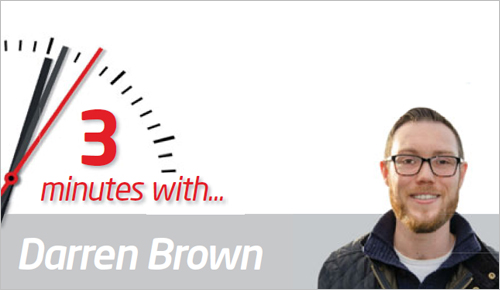With World AIDS Day occurring this week, Darren Brown explains how he developed the skills needed to be a specialist physiotherapist in HIV.

Tell us a little about your job
I am based at the Chelsea and Westminster hospital. The Chelsea and Westminster NHS Foundation trust is the largest HIV unit in Europe and the national referral centre for HIV-associated malignancies. A large proportion of my role is providing inpatient and outpatient rehabilitation for adults living with HIV.
I am also vice-chair of the Rehabilitation in HIV Association (RHIVA), am the HIV/AIDS special interest group coordinator for a World Confederation for Physical Therapy network and member of the Canada-UK HIV Rehabilitation Research Collaborative. I am researching rehab interventions for adults living with HIV and writing a paper evaluating an outpatient rehabilitation intervention for adults living with HIV called the Kobler rehab class, which I have developed.
How did you get into the field?
My BSc degree was in human musculoskeletal sciences, so I have always had a huge interest in human anatomy and function. I have always had an interest in HIV and its effect on a wide range of human body systems. It was a natural progression for me to focus on the role of rehabilitation, disability and physiotherapy for adults living with HIV. My career had always been working towards acquiring the transferable skills to become a specialist in HIV which were essential in developing my current role, so that I can meet a wide range of needs for each of my patients.
What are the rewards?
I am lucky to work in a field that I am so passionate about and to be able to share my work nationally and internationally. But my biggest reward is making the difference for each patient. It’s about knowing that daily I continue to provide a rehabilitation service safe from stigma, while championing the rights of people living with HIV to access rehabilitation, live independently and have the best quality of life possible.
It’s very specialist – is that good for building a career?
HIV is considered a chronic illness. More people living with HIV are living longer with health-related consequences of HIV, ageing, and emerging concurrent chronic health conditions. As a result, there is an increasing role for physiotherapists to respond to the complex disability experienced by people living with HIV. However, the field of HIV and rehabilitation is still emerging with Canada and the UK as leaders in the field. People with HIV in these countries face challenges in accessing rehabilitation services and in social participation issues. Those who are ageing face an increasing range of concurrent health conditions.
Specialising in HIV means that I am able to maintain and develop many skills across physiotherapy practice, enabling exciting career opportunities. There are very few people internationally who specialise in HIV and rehabilitation, which has opened doors for me to be proactive, resourceful and happy in my career. However, this also means that there are limited opportunities for peer support and learning among physiotherapists. RHIVA offers support to both therapists who specialise in HIV and therapists who do not specialise in the field.
What did you do for World AIDS Day on 1 December?
Many events took place across the UK including the publication of CSP resources on HIV and the launch of the Federation of HIV Associations (FHIVA). FHIVA provides a united voice for the UK’s professional HIV healthcare organisations, to safeguard clinical excellence in caring for people with HIV. This is a huge milestone for rehabilitation in HIV. Internationally for World AIDS Day, RHIVA helped co-host a Twitter chat on the role of physiotherapy in HIV.
Any Christmas break plans?
I spend Christmas with my family. It’s nice to escape London, succumb to the rural way of life and indulge in it all. fl
- Darren Brown, band 7 specialist physiotherapist, Chelsea and Westminster hospital, London
Author
FrontlineNumber of subscribers: 0
